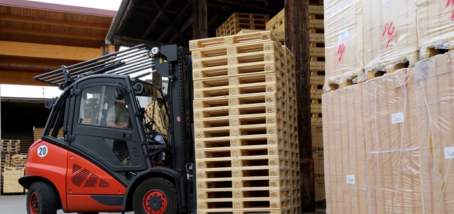-
Nutrivend selects Forterro’s Orderwise to support online expansion and streamline operations - April 11, 2025
-
ARROWXL LAUNCHES AMBITIOUS ZERO WASTE ROADMAP - April 8, 2025
-
THE BCMPA’S NEW CAMPAIGN DRIVES OUTSOURCING SUCCESS IN Q1 - April 7, 2025
-
BLACKOUT TECHNOLOGIES TARGETS TELEMATICS-INTEGRATED MOBILE DEVICE BLOCKING TO COMBAT SMARTPHONE DISTRACTION - April 1, 2025
-
OpenADR Alliance announces first OpenADR 3.0 certified products with EVoke Systems, E.ON Energy and Universal Devices - March 25, 2025
-
Growing fulfilment and contract packer appoints new Managing Director - March 25, 2025
-
When is it time to invest in a WMS? Understanding the key trigger points - March 25, 2025
-
eCapital helps Vantage Recruitment on its journey to financial success - March 24, 2025
-
Hugo Beck Celebrates 70 Years of Packaging Innovation with Open House Events - March 20, 2025
-
PROLOG FULFILMENT SUPPORTS LUNA DAILY’S COMMITMENT TO BETTER BODY CARE FOR ALL WOMEN - March 19, 2025
EPAL UK & Ireland has reported pallet sales increases of 13 per cent in the third quarter of 2020, as businesses prepare for the final Brexit cut off on December 31. The open-loop pallet pooler manufactures and repairs all its pallets to an ISPM15-compliant standard, meaning they conform to regulations governing packaging movements that come into force on January 1 next year.
Wooden pallets and packaging that originate within the European Union are generally free to move between member states without having to meet international ISPM15 standards. However, when the UK leaves the EU, regulations state they must be heat-treated and marked as ISPM15-compliant when travelling in either direction between the UK and the EU. This means they may be subject to official checks that may delay shipments for a period immediately after Brexit.
The timber packaging and pallet industry has worked hard with industry and the UK government to build up stocks of compliant wooden pallets and packaging, expanding the country’s kilning capacity and announcing that ISPM15-marked components can be used to repair used pallets, for example. Nevertheless, EPAL’s chairman says some companies have sought out guaranteed sources of ISPM15 compliancy such as EPAL.
Paul Davidson, Chairman of EPAL UK & Ireland, said: “We have seen a rise in demand from businesses wishing to eliminate completely the risks to their supply chains of the new regulations. When pallets are ISPM15-compliant, they are free to move through customs across Europe, and throughout the world, and won’t be the source of unnecessary details; so business have been looking for established suppliers. As EPAL pallets are kiln dried to ISPM15 specifications as standard, they automatically conform to these regulations.”
Other benefits of using EPAL pallets are that they are: safe for loads of up to 1.25 tonnes; kiln-dried, giving them extra strength and durability; and specified ‘as new’ whenever they are repaired.
































